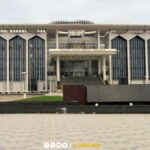Public sector workers in Nigeria earning the minimum wage will see their salaries doubled following an agreement reached on Thursday between the government and labor unions, which had been threatening further strikes due to the escalating cost of living.
The new minimum monthly wage is set at 70,000 naira ($44), significantly lower than the unions’ demand but still a substantial increase. The unions had initially sought an increase to nearly 500,000 naira, but settled for the government’s offer with “mixed feelings,” according to Nigerian Labour Congress President Joe Ajaero. This agreement followed a meeting with President Bola Tinubu in Abuja.
The new wage will not take effect immediately, as it requires approval from federal lawmakers. The passage of a new law is necessary to formalize the pay increase.
Since taking office in May last year, President Tinubu has implemented several economic policies, including the removal of fuel subsidies and the unification of the country’s multiple exchange rates. These measures have led to the devaluation of the naira against the dollar, causing gasoline prices to more than double and inflation to soar to 34.1% last month, the highest in nearly three decades.
The labor unions had demanded a substantial increase from the current minimum wage of 30,000 naira to nearly 500,000 naira. The government’s rejection of this demand led to a fresh wave of strikes that brought the nation to a standstill.
Despite the agreed increase, many Nigerian governors have expressed concerns about their states’ ability to afford the new minimum wage. The impending legislation would compel them to implement the pay rise, despite these financial challenges.
Nigeria, one of Africa’s top crude oil producers, remains one of the world’s poorest countries, largely due to chronic corruption. The disparity between the lavish lifestyles of public officials and the general population is stark. While lecturers and medical professionals often strike over inadequate wages, politicians continue to receive substantial salaries and regular monetary compensation, even for unofficial functions.
Last year, President Tinubu approved millions of dollars in spending on sport utility vehicles, including for his wife, whose office is not constitutionally recognized, highlighting the ongoing issues of fiscal mismanagement and inequality.







